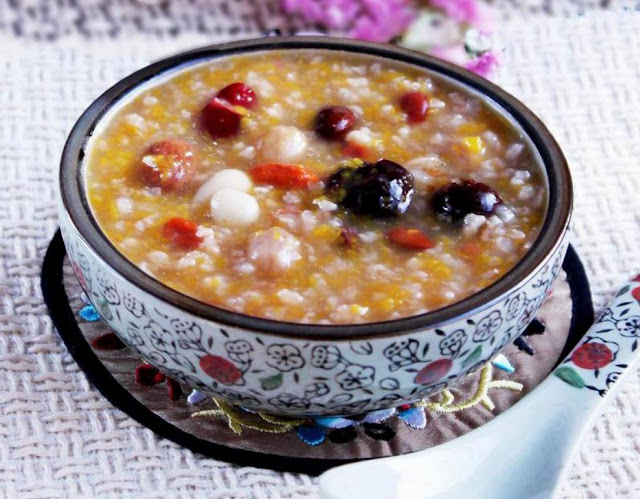 |
Laba Porridge
(Image: Meishichina.com)
|
A traditional food eaten on the day of the Laba Festival is Laba porridge (臘八粥 Laba Zhou) which is made from a combination of glutinous rice and many different kinds of grains, cereals, beans, dried fruits, and nuts that may include - but are not limited to - millet, lotus seeds, melon seeds, jujube dates, longan (dragon’s eye fruit), Job’s tear grains, red beans, peas, gingko nuts, chestnuts, walnuts, almonds, pine nuts, and peanuts.
 |
Grains and beans used for Laba porridge
(Image: Nipic.com) |
The porridge can be made sweet or savory by adding sugar or salt depending on regional preferences. Other condiments like cinnamon can also be added for additional flavor. Laba porridge is also sometimes called Eight Treasures porridge (八寶粥 Babao Zhou) because it is sometimes made from a traditional list of eight kinds of ingredients.
 |
The eight different kinds of ingredients plus rice for Eight Treasures porridge
(Image: Source unknown)
|
 |
A family prepares Laba porridge for the festival
(Image: Source unknown)
|
There are several explanations about the origin of Laba porridge. One explanation is that after the autumn harvest, porridge made from the harvested food ingredients is made and offered in thanksgiving to the heavenly deities and/or ancestors. Another explanation is that it was both a celebration of the harvest and a form of nutritious food for people in winter time because the porridge is a healthy mixture of many wholesome ingredients.
 |
Laba porridge is a health food
(Image: Source unknown) |
Another explanation connected with the Chinese Buddhist tradition says that Laba porridge is eaten to commemorate Lord Buddha’s enlightenment because while undergoing ascetic practices, the Buddha eventually realized that extreme forms of asceticism did not promote spiritual awakening, so he abandoned them and accepted a rice porridge offered to him by a young maiden. The porridge helped him regain his physical strength and he later found supreme enlightenment. That is why Laba porridge is also called Buddha’s porridge (佛粥 Fo Zhou) (however, the porridge that the Buddha ate did not have so many ingredients, because according to the original Indian Buddhist story, the Buddha ate only a porridge made of milk and rice). In all probability, the earlier practice of cooking porridge as a post-harvest custom was merged with the commemoration of the Buddha’s enlightenment that came to be observed in
 |
The Buddha became emaciated and weak from practicing austerities.
He later abandoned them because they did not lead to spiritual enlightenment.
(Image: Source unknown) |
 |
The maiden Sujata offered a bowl of milk rice porridge to the Buddha
which restored his strength after he became weak from practicing austerities
(Image: Source unknown) |
 |
After restoring his health, the Buddha attained supreme enlightenment
(Image: Source unknown) |
 |
Buddhist monks in
(Image: Chinanews.com) |
Aside from eating Laba porridge, religious activities during the Laba Festival usually include ceremonies for honoring Lord Buddha (Shakyamuni), and prayers and rites for good health and blessings.
 |
Laba Festival cartoon drawing
(Image: 5liao.cc) |
May everyone have a happy Laba Festival!
Text © 2011 Harry Leong